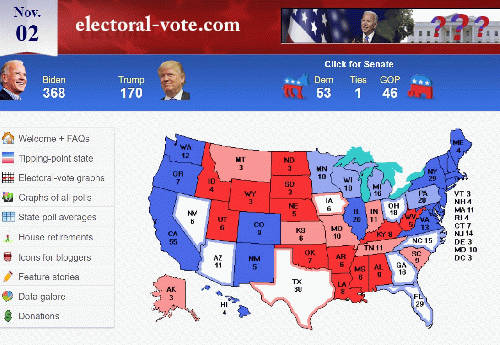"With fear for our democracy, I dissent."
-- Justice Sonia Sotomayor
A grand experiment in democracy began when the Continental Congress voted to declare independence from England on July 2, 1776. The thirteen colonies would no longer be ruled by a King who derived his power from a line of succession. Instead, leaders would rise from the populace. Their power would not be absolute but would be restrained by the rule of law.
With a nation weary of war and the growing pains of building a new country, George Washington could have turned his win as the first President of the United States into a lifetime appointment. Instead, he voluntarily stepped down after two terms. With the help of Alexander Hamilton's words, he set the example for a peaceful transfer of power that would set a precedent for almost 225 years.
And then Donald Trump came along.
Riding a wave of racist discontent after the election of the first black President, Trump beat the overwhelming odds against him and won the 2016 election. As with five of the six previous Republican candidates, Trump lost the popular vote. However, he was able to secure enough swing states to win the Electoral College. Following in George W. Bush's 2000 footsteps, now a second time in a generation, a president took office without the majority's support.
A real leader would have put his ego aside and looked for ways to build bridges, using common ground to bring the country together. Instead, Trump threw kerosene on the fires of division and the slide toward the Divided States of America accelerated. Instead of loyalty to the country, patriotism transitioned to fealty to a man. Debates were no longer about ideals and the direction of the country, but WWE-like events where the goal was to humiliate your opponents. Compromise became a sign of disloyalty punishable by excommunication from the party.
With Washington D.C. remade in his own image, Trump faced a once-in-a-lifetime crisis as COVID spread across the globe. Having dismantled the National Security Council's directorate for Global Health and Security and Bio-Defense, the administration was ill-prepared to deal with the effects. As the number of cases climbed and the death toll increased, the economy collapsed. The record streak of monthly job creation that started during the Obama administration ended and unemployment skyrocketed. Americans waited in line for necessities like toilet paper.

Are you better off than you were four years ago? The meat counter on March 15, 2020.
(Image by Carl J. Petersen) Details DMCA
Unwilling to hold Trump accountable for his part in the crisis, his followers clung to mind-numbing conspiracy theories. The political divide grew as the Blue States followed science to navigate their way through uncharted waters while leaders in the Red States stoked their base by rallying against masking, isolation, and vaccines. With Trump unable to become the leader the country needed, the death toll quickly rose.
The introduction of vaccines brought a visible light at the end of the tunnel, but the damage had already been done. With his poor management of the crisis fresh in their minds, the electorate voted for the Democratic candidate for the seventh time in eight elections. Even the Electoral College could not save him.

Electoral-vote.com (electoral-vote.com/evp2020/Pres/Maps/Nov02.html)
(Image by Electoral-vote.com) Details DMCA
Trump's loss should not have been a surprise. He had done nothing to expand his base, demonizing those who had voted against him instead of trying to reach out to them. The polls showed Biden held a "stable lead in the national polls" and the challenger held a wide lead in the expected Electoral College vote count. Yet, instead of acknowledging defeat, Trump led a deadly attack on the Capitol in an attempt to seize power and overthrow the will of the voters.
When prosecutors charged Trump with crimes related to the criminality of his administration, the defeated President tried to claim that he had absolute presidential immunity. The pundit class laughed at the suggestion that Presidents were above the law and the trial judge agreed. Then the appellate court ruled that the idea was preposterous. That left the Supreme Court as Trump's only hope.
While luck (along with cheating and hypocrisy by Mitch McConnell) had given Trump the ability to appoint three judges to the Supreme Court, these judges had planted their flags on the concept of originalism. If the experience of the Founding Fathers were considered above all else when deciding constitutional issues, giving a President the powers of a monarch was certainly out of the question. Patriots had risked their lives to declare independence from that type of power.
(Note: You can view every article as one long page if you sign up as an Advocate Member, or higher).





